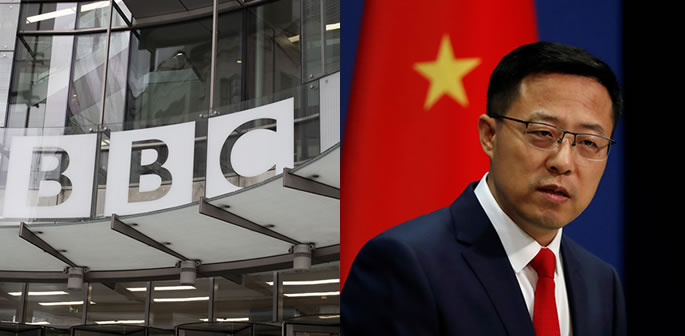"BBC has produced fake news time and again"
China launched a scathing attack on the BBC, calling it a “Bad-mouthing British Corporation”.
The BBC was accused of broadcasting “fake news”.
The attack was delivered by Foreign Ministry spokesperson Zhao Lijian and it came after China faced growing criticism over the treatment of foreign journalists in the country.
This was brought to a head during the Henan floods.
Beijing was accused of openly endorsing intimidation and harassment of foreign journalists.
This included one involving BBC Shanghai correspondent Robin Brant who became a victim of a hate campaign on Chinese social media site Weibo.
Mr Brant had raised questions over potential failures from authorities in relation to the floods.
There was a year’s worth of rain in Zhengzhou in just three days, leaving 14 people dead and more than 500 commuters trapped when the city’s subway system flooded during rush hour.
The hashtag #BBCSpreadsRumours began circulating on Weibo and was later promoted by Chinese state media.
The Henan Chinese Communist Party Youth League later called on its more than one million followers to seek out Mr Brant and call the police if he was found.
But angry residents mistakingly restrained journalist Mathias Boelinger in the street.
The BBC said its reporters had been subjected to online hate while other outlets had been harassed on the ground in “attacks which continue to endanger foreign journalists”.
However, Mr Zhao slammed the BBC, saying it deserved to be “unpopular with the Chinese public”.
He said: “Do you know that the Chinese netizens refer to BBC as ‘Bad-mouthing Broadcasting Corporation’.
“Having long been clinging to its ideological bias against China, BBC has produced fake news time and again, spread false information on issues related to Hong Kong, Xinjiang and Covid-19, attacked and vilified China in serious deviation from the professional ethics of journalism.
“Everything happens for a reason.”
Western media coverage has threatened to undermine such a position by dismissing calls for press freedom as a cover to “fabricate fake news”.
Mr Zhao continued:
“Robin Brant, BBC journalist stationed in Shanghai, continued to put ideology above facts in his report about the torrential rain in Henan, turning a blind eye to the fact that the Chinese government has been sparing no efforts in conducting rescue work, and local residents have been volunteering help.
“Some Western media should ask themselves as to why their reports have caused public outrage in China.”
“They make no mention of the enormous assistance and convenience China has provided to foreign journalists in their reporting.”
BBC is known in China as the “Bad-mouthing Broadcasting Corporation”. pic.twitter.com/2W4rnCJu99
— Lijian Zhao ??? (@zlj517) July 29, 2021
Mr Zhao’s comments were picked up by tabloid newspaper and Beijing mouthpiece The Global Times.
Editor-in-chief Hu Xijin said such resentment of foreign media was “completely justifiable”.
However, he said physical harassment of reporters would only fuel biased reporting.
Earlier in 2021, The Global Times criticised the BBC over a documentary it released about original Covid-19 epicentre Wuhan and its return to normality.
It accused the BBC and reporter John Sudworth of using a grey footage filter to “deliberately create a depressing and dark atmosphere”.
Mr Sudworth fled China for Taiwan earlier in 2021 over fears for his safety.
Mr Zhao said foreign correspondents “enjoy an open and free reporting environment in China”.
But press freedom groups say the space for overseas reporters to operate is tightening, with journalists followed on the streets, suffering harassment online and refused visas.
Officials and state media have long accused Western news organisations of anti-China bias.






























































